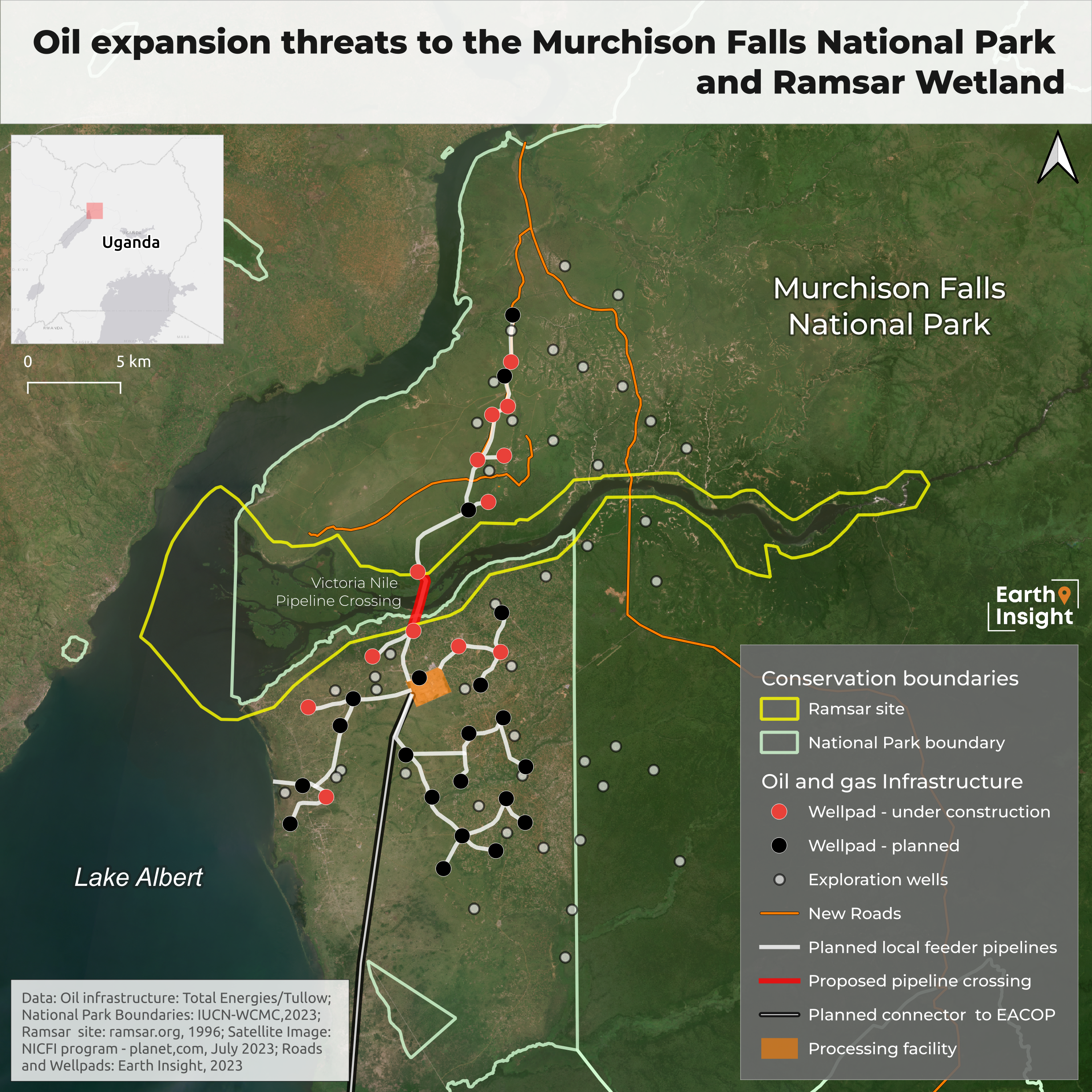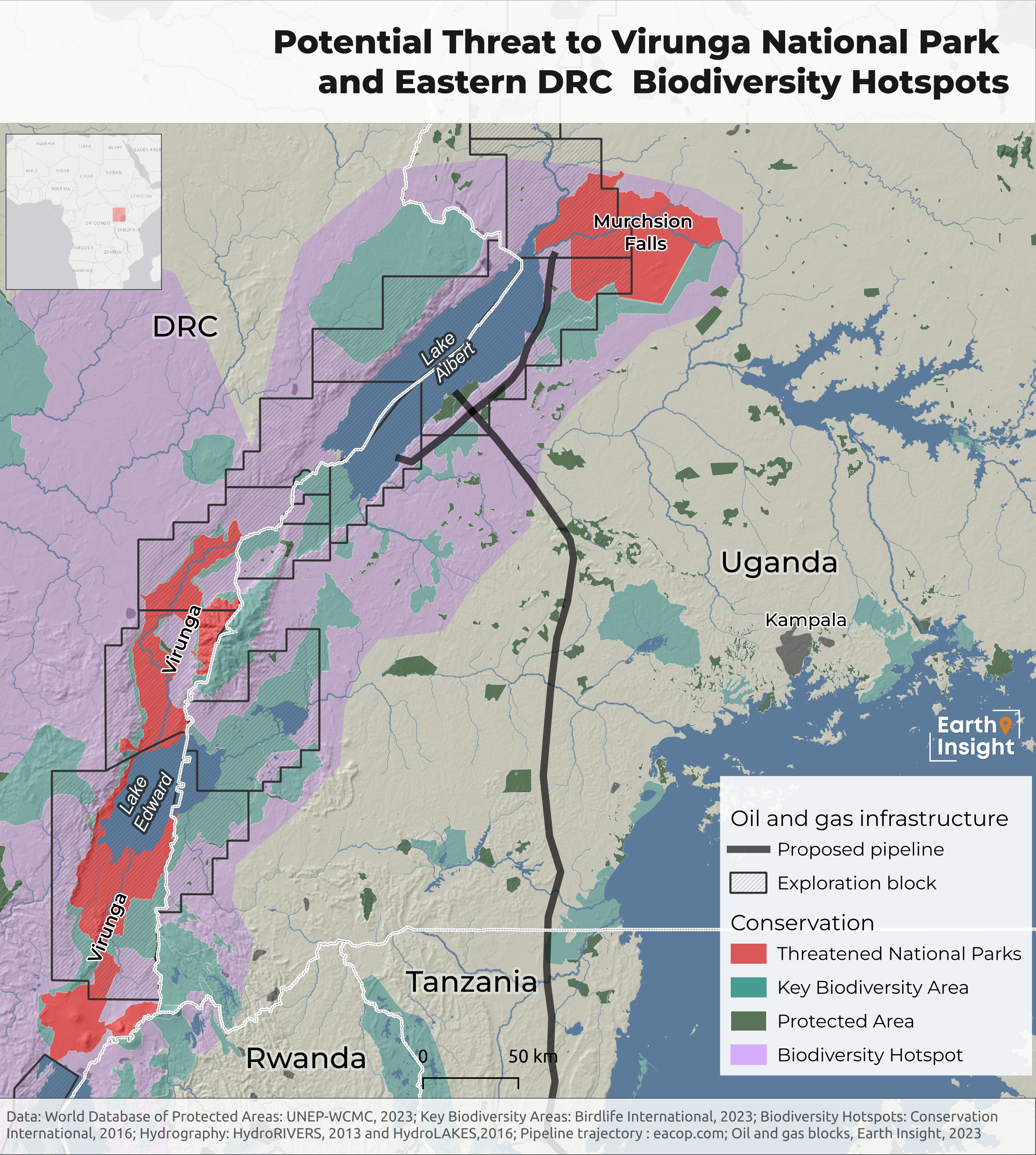An oil pipeline megaproject is planned to carve through East Africa despite major concerns about how it will impact the climate, local communities, and biodiversity.
The East Africa Crude Oil Export Pipeline (EACOP) is a planned pipeline that’s set to run for 1,443 kilometers (896 miles) between oilfields on the shores of Lake Albert in Uganda to Tanzania’s Port of Tanga on the Indian Ocean. Once up and running, it will be the world’s longest heated oil pipeline.
The megaproject has been under discussion since 2013. Some of the major corporations involved in the plans are Tilenga, operated by French multinational TotalEnergies, and Kingfisher, part of the majority state-owned China National Offshore Oil Corporation.
As ever with major infrastructure developments, its backers argue that the fossil fuel pipeline will “unlock” the economic potential of the region’s natural resource, bringing jobs and fresh opportunities.
Yet for the people living here, many are worried the EACOP could spell disastrous social and environmental impacts.
Fossil fuel extraction around Lake Albert in Uganda has already seen the development of hundreds of oil wells, including many in the Murchison Falls National Park, and nearly 31,000 people had to abandon their homes. If and when the EACOP gets the go-ahead, this situation is set to intensify.
Previous estimates have suggested the development could directly impact the land of at least 120,000 people in the region. Legal complaints have argued that the affected communities have not been adequately consulted by the governments and international oil companies involved, nor have they been provided with sufficient safeguards to address the ecological and human rights risks.
“We are worried about the high pollution risk that the Tilenga and EACOP projects pose to Ramsar wetlands in Uganda, Tanzania, and the DRC,” Dickens Kamugisha of Africa Institute for Energy Governance in Uganda said in a statement sent to IFLScience.
“In Uganda and Tanzania, they have been unable to manage impacts arising from their compulsory land acquisition processes for the Tilenga and EACOP projects. They have also been unable to manage the flooding as well as dust, noise and light pollution impacts seen because of the Tilenga project in Buliisa district in Uganda,” continued Kamugisha.

Map showing where fossil extraction and exploration is planned Around the Murchison Falls National Park and Ramsar Wetland.
Image courtesy of Earth InSight
Earth InSight has compiled research that highlights how the pipeline project threatens local communities and critical ecosystems in Uganda, Tanzania, and the Democratic Republic of Congo (DRC). In newly produced maps, they show that the EACOP could likely have a “far larger footprint” than previously estimated.
In Uganda, the project could see the expansion of oil wells into Murchison Falls National Park – home to more than 73 animal species including buffaloes, leopards, lions, giraffes, and elephants – as well as regions of the Victoria Nile River and surrounding wetlands feeding into Lake Albert.
“The maps show that Total is constructing seven of the ten well pads that are to be located within Murchison Falls National Park. Two of the well pads are too close to the Murchison Falls-Albert Delta Ramsar site. This is disheartening to see,” Patience Katusiime of the Environment Governance Institute in Uganda said in a statement seen by IFLScience.
“TotalEnergies often says that they are using a small part of the park but these new satellite images show that a combination of oil roads, bridges, oil feeder pipelines, and well pads could destroy Murchison Falls National Park forever,” Katusiime added.

A map shows the route of the proposed pipeline along potential threats to the Virunga National Park and Eastern DRC.
Image courtesy of Earth InSight
At the other end of the pipeline, many are arguing that the shores of Tanzania will be put at a heightened risk from oil transport leaving Tanga Port.
“Along the Tanzanian shore, two important Ecologically or Biologically Significant Marine Areas (EBSAs) – the Pemba-Shimoni-Kisite site and the Tanga Coelacanth site – are at high risk from oil leaving the port at Tanga. […] The Pemba-Shimoni-Kisite site is known for its coral reefs, as well as the endemic coconut crab (Birgus latro), the largest land-living arthropod,” said Richard Sekondo of Organisation for Community Engagement.
“These need to be protected,” Sekondo added.
The EACOP could also have a ripple effect in oil-rich neighbors of Uganda. Earth InSight says their new maps indicate that fossil fuel extraction in the DRC will be made “much more likely” if the pipeline project pushes forward. This includes portions of the iconic Virunga National Park, home to mountain gorillas, chimpanzees, and many other charismatic species.
Climate change and greenhouse gas emissions are yet another issue that looms over the EACOP. Wednesday, September 6 2023, marks the conclusion of the Africa Climate Summit in Nairobi, a series of international talks designed to promote renewable energy and climate finance solutions for Africa.
It’s been said that the EACOP will mark a major step back from the hope of a greener future. It’s estimated the pipeline would transport oil that will generate over 34 million tons of carbon emissions each year, more than some entire countries.
Source Link: A Massive Oil Pipeline Threatens To Carve Through The Heart Of Africa